Best 4000+ PSI Pressure Washers
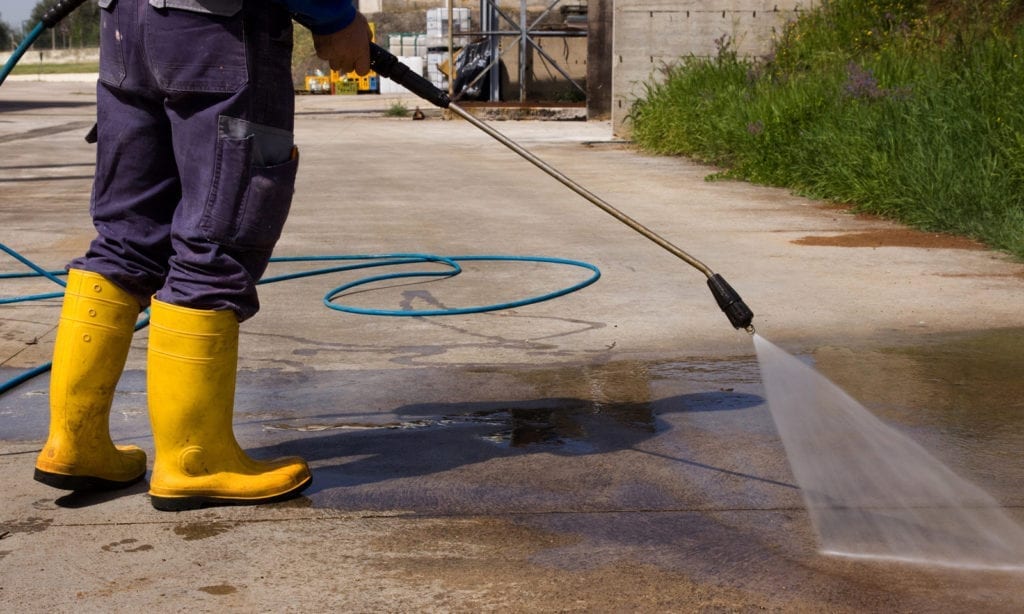
Pressure washers offer a convenient and effective solution to a vast range of dirt-related problems, whether it’s washing the outside of your home or cleaning industrial-level stains from some concrete flooring. However, they’re not completely interchangeable – no two pressure washer models will be exactly the same, and the differences in their designs or specifications can completely change what they are meant to be used for, especially when it comes to the power and pressure of the water spray they can create.
Using the wrong pressure washer in certain situations can even become a serious hazard to you and the people around you, and might end up causing permanent damage to your home or possessions. Below is a list of the eight best 4000-PSI pressure washers we could find, as well as some of their best features and accessories.
View the Best 4000 PSI Pressure Washer, Below.
- SIMPSON Cleaning ALH4240
- Pressure Pro E4040HC Heavy Duty
- Briggs & Stratton Gas Pressure Washer
- Generac 6565 Pressure Washer
- SIMPSON Cleaning PS4240 PowerShot
- DEWALT DH4240B Heavy Duty Pressure Washer
- Champion 100386 Gas Pressure Washer
- NorthStar 15782020 Pressure Washer
1. SIMPSON Cleaning ALH4240

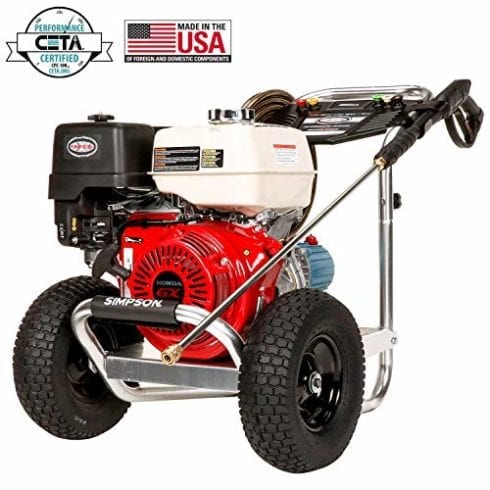
The ALH4240 is a gas-powered pressure washer that can generate powerful streams of water at up to 4200 PSI, stripping away dirt and stains with easy-to-control bursts of high-pressure water.
It’s surprisingly powerful Honda GX390 engine can produce a lot of power without running dry too quickly, and the durable aircraft-grade aluminum tube frame ensures that it’s protected from physical damage both indoors and out.
This, along with its thirteen-inch wheels and fifty-foot hose, lets you move this pressure washer safely across a range of surfaces and reach locations that other cleaning tools can’t.
This little pressure washer can output a lot of power while still keeping itself safe and easy to handle, making it perfect for taking on industrial-level stains and large cleaning jobs.
Check Price on Amazon ➞2. Pressure Pro E4040HC Heavy Duty
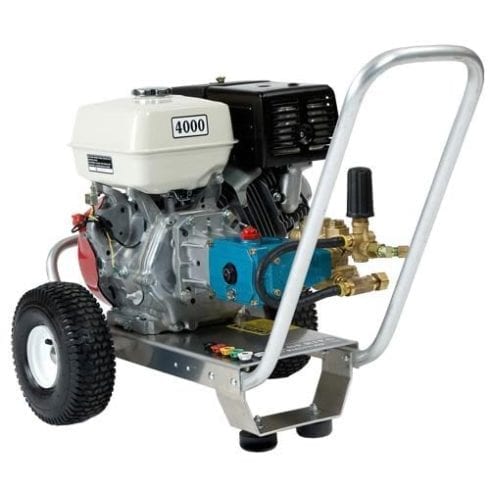
The 13-horsepower GX390 used to power this pressure washer gives each stream of water plenty of force behind it, but it won’t wear itself out quickly – the built-in Thermo Sensor makes sure that it won’t unexpectedly overheat, meaning that it’s much safer for long periods of continuous use.
Its high-pressure hose is re-enforced to prevent it from breaking or leaking easily, while the durable frame uses high-quality connecting and mounting spots to hold together through all kinds of physical damage. On top of that, the engine’s automatic low oil shutdown system will prevent it from damaging itself if it’s running out of fuel.
This pressure washer offers a nice balance of power and reliability and is versatile enough to clean a range of different surfaces without running into performance issues.
Check Price on Amazon ➞3. Briggs & Stratton Gas Pressure Washer
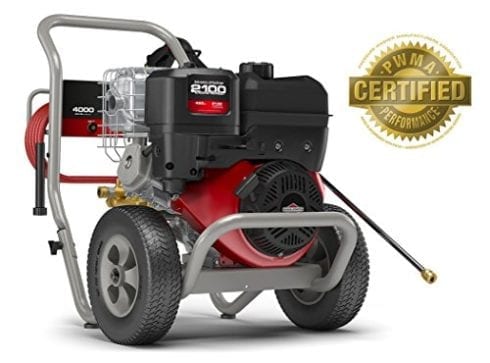
This top-of-the-line pressure washer provides all the power of a strong Briggs and Stratton 2100 engine without being bulky or too heavy to move around. It’s durable body and wheels can support the weight of the entire unit across almost any terrain.
Full compatibility with washing detergents and solutions make it easy to add some extra cleaning strength to the bursts of water it can create. At 4000 PSI, this pressure washer can take on both minor and major cleaning jobs without feeling like it’s too weak to finish off what it starts.
The pressure regulator lets you adjust the strength of your water to suit the situation, adding some extra versatility to an already-great cleaning tool.
Check Price on Amazon ➞4. Generac 6565 Pressure Washer
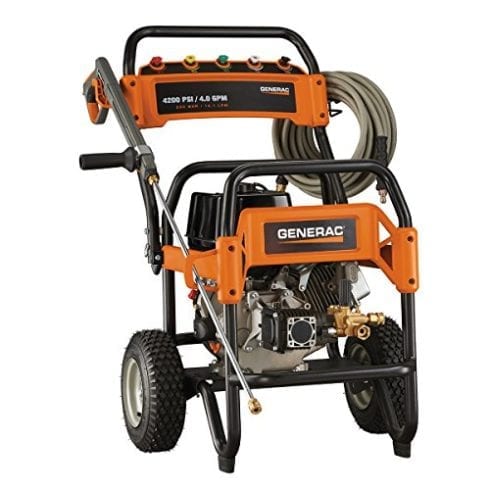
The Generac 6565 is a high-quality pressure washer that’s designed to take on a big range of different cleaning jobs, especially thanks to its fifty-foot hose. The 420C Generac OHV engine acts as a strong, reliable and safe power source, using an automatic low-oil shutdown system to stop the engine from damaging itself.
The strong triplex pump helps fire out streams of water at 4200 PSI, boasting a ceramic coating to increase its lifespan, while the large tired and robust frame ensures that you won't damage the key components, of this pressure washer, by accidentally bumping it against a surface.
This small pressure washer unit packs a lot of power into a small area, and can easily be kept in a garage or cupboard for when you’re not using it.
Check Price on Amazon ➞5. SIMPSON Cleaning PS4240 PowerShot
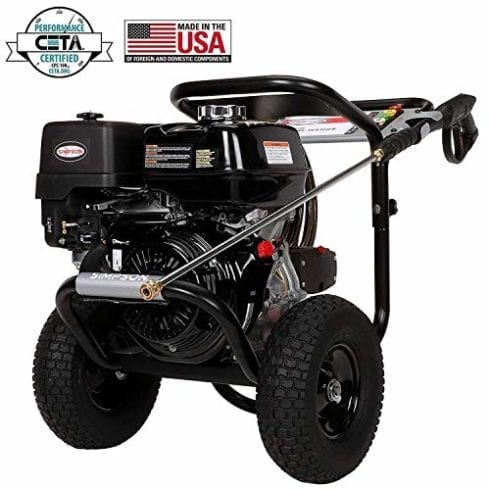
The SIMPSON PowerShot has a strong Honda engine at its core, using it to generate 4200 PSI jets of water that can strip dirt and stains off surfaces in very little time. The welded steel used in its frame keeps all of its internal parts safe from accidental bumps and bashes.
The built-in triplex pump allows the whole unit to operate at much higher pressures without increasing the chance of something breaking. The spray gun-style hose with an ergonomic trigger gives you greater control over the cleaning process, letting you aim at areas that a thicker and less stable hose would struggle to reach.
The slim, spray gun-style hose attached to this pressure washer is ideal for delivering concentrated and powerful blasts of water in areas that a regular hose won’t handle well.
Check Price on Amazon ➞6. DEWALT DH4240B Heavy Duty Pressure Washer
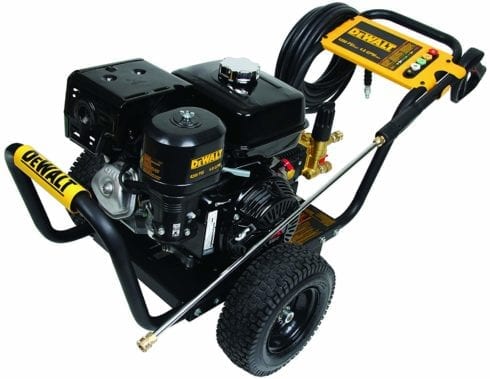
The DEWAT DH4240B is a powerful pressure washer that’s built for all kinds of heavy-duty cleaning work, using a high-pressure triplex pump and ceramic-coated pistons to reach up to 4200 PSI without needing any extra tools or attachments.
The double-sealed pneumatic tires make it easy to cross both smooth and rough ground without getting caught on bumps, while the 10-gauge steel frame and sub-frame ensure that nothing will get damaged in the process. Its fifty-foot hose allows for strong, accurate streams of water in a massive radius around the unit itself, making it much easier to clean broad areas or surfaces.
This pressure washer offers a lot of power while still making safety a top priority, with the thermal relief valve and unloader helping you stay safe during the cleaning process.
7. Champion 100386 Gas Pressure Washer
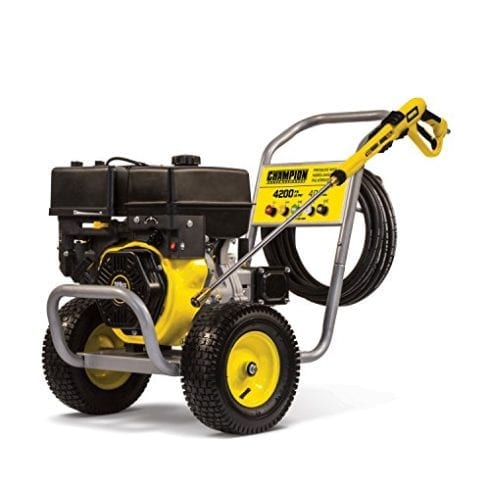
The Champion 100386 is a 4200-PSI pressure washer that uses a strong 389cc OHV engine with a single cylinder, letting it generate a constant stream of high-pressure water through its Annovi Reverberi triplex pump.
The spray gun-style hose, on this powerful pressure washer, acts more like a large spray wand, making it much easier to control and aim while also giving you the ability to clean smaller spaces, all from the comfort of its ergonomic trigger.
This pressure washer uses a simple, surprisingly compact design to it’s fullest potential, offering two different hoses and a range of nozzles to make cleaning varied surfaces much easier.
Check Price on Amazon ➞8. NorthStar 15782020 Pressure Washer
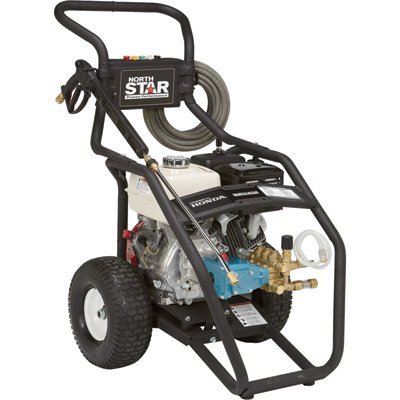
This NorthStar pressure washer uses a powerful Honda GX392 engine that offers an excellent level of performance without being too loud or bulky to use around your home. The durable triplex pump can generate up to 4000 PSI without affecting its efficiency or the user's safety, using a direct drive design that cuts out a lot of moving parts to create a much more reliable pressure system.
The strong and lightweight steel roll cage and fifteen-inch pneumatic tires make it much easier to push the whole unit across almost any terrain, letting you clean practically anywhere with ease.
The safety features on this pressure washer make it much safer for first-time users, but they also ensure that professionals will get a much longer lifespan out of it compared to other washer styles.
Check Price on Amazon ➞4000 PSI Pressure Washer Buyer’s Guide
Like many pieces of heavy-duty equipment, there are certain things that you need to look out for when you’re trying to buy a pressure washer for a specific purpose. Even if they look similar, there’s no guarantee that two different models will function in the same way, even if they’re produced by the same company or use the same parts. The slightest change in performance, design, durability, or functionality could completely alter the way you’ll be able to use it.
Cleaning Power
Pressure and cleaning power are often seen as interchangeable terms, but they can still be measured as different things in certain situations. A high-pressure washer with a tiny nozzle will only produce a small jet of water – one that’s great for getting rid of dirt, but terrible at actually covering a wide area. Wider nozzles at lower pressures will have the opposite problem, covering a vast area but not providing much of a kick.
In most cases, though, there will be less extremes – you’ll be able to clean most stains with an average-strength pressure washer, but you still need to decide whether pressure or coverage is more important to you. Being able to drench a broader area in water can make cleaning take less time, but it might take longer to get rid of stains that aren’t washed off in the initial blasts, so it mostly depends on the types of stains and dirt that you’re dealing with.
Other features can come into play here, too – detergent tanks or hoses allow you to add some extra soap and cleaning solutions to your washer without risking any damage to its internal parts, but this still requires you to fill up a separate tank, make sure it’s connected and then use both hoses at the same time for maximum cleaning power, which can take far longer than simply using a more powerful hose to try and blast the dirt off normally. On the other hand, you might have to deal with a stain that can only really be broken down with soap or cleaning liquids anyway.
In general, the “cleaning power” of your pressure washer is simply how suited it is to the situation you’re dealing with. Industrial-strength pressure washers are often designed to eliminate this problem by generating extremely high-pressure blasts of water, but these are far too big and expensive to keep around your home, so you’ll have to try and choose between different heavy-duty models based on their relative strengths and weaknesses instead.
Usability and Complexity
Like with all tools, there will always be some that are far too confusing for newcomers and first-time users to understand without practice. Using a complicated pressure washer without knowing how it works can be dangerous, since you’re essentially handling a water cannon that’s strong enough to strip dirt and stains off solid surfaces.
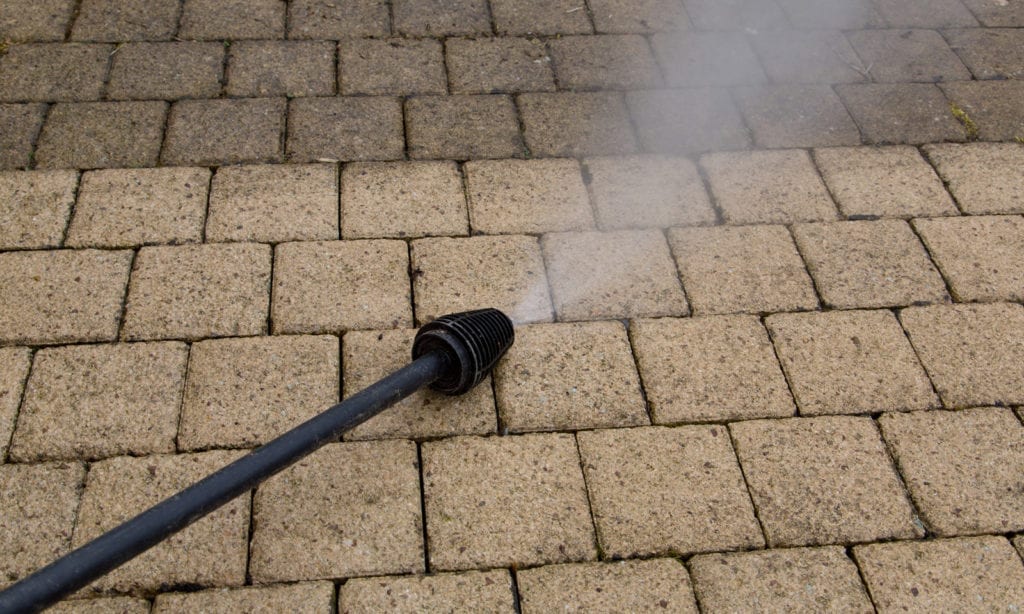
There a chance of you accidentally hitting something or someone with a jet of water powerful enough to cause permanent damage, and the high pressures involved can lead to accidental explosions or malfunctions if you let it build up too high without realizing it.
As a general rule of thumb, a simpler pressure washer will trade some of its power and useful features for an easier, more manageable design that anybody will be able to use. As you move further up the complexity scale, you’ll see more and more features that improve the cleaning power and performance of each pressure washer, at the cost of being harder and harder to use.
For example, most easy-to-use pressure washers will have a single hose that can be used like any standard garden hose (or spray wand, depending on the design). However, some will have multiple hoses that are meant for different things, including spraying detergent or letting out water at a different pressure level.
Even a single extra hose can double the number of things you have to manage, which can be enough to confuse first-time pressure washer users and might even lead to accidents or unintentional property damage if they end up using it incorrectly.
However, complexity isn’t the only thing that matters here – some pressure washers will just be more usable than others depending on their design and the features they use. The lighter a model is, the easier it’ll be to move around, and longer hoses allow for a greater cleaning range with no real downside.
This is simply more usable than a similar model with a heavier frame or smaller hose, and this can often be the deciding factor if you need your new pressure washer do to specific things or handle certain conditions that not all models will be able to accommodate properly.
Extra Features
Some pressure washers come with additional features that make certain things easier, such as cleaning cars or allowing for instant pressure adjustments. Many of these features will be completely optional, but some might actually be required for it to function – for example, a pressure washer that uses a knob-based pressure adjustment system might not have any other way for you to adjust it, but one that comes with a spray wand won’t force you to use the wand unless you need it.
It’s important to make sure you understand this difference before you buy something based on its features: in many cases, a feature that’s built into the pressure washer itself will be more durable and provide better functionality at the cost of being a required tool, whereas optional features or separate pieces of equipment offer more versatility but might not be as durable or powerful.
Many optional features, like interchangeable nozzles, will provide more functionality without getting rid of any other features or stopping you from using the washer in certain ways, so having them is generally a direct upgrade from a model that doesn’t have them.
This can also include things like automatic low-fuel stops, coated pistons, extra water tanks, longer hoses, and other optional parts and accessories that alter or improve the pressure washer functions.
Not all pressure washers will come bundled with their optional extras and might require you to purchase them separately at some point instead. It’s always good to check and make sure before you commit to a purchase like this since it can push you over your expected budget if you’re trying to limit how much you spend.
It can also sometimes take longer to get all the parts together if you’re buying them online or over the phone, meaning that short-notice cleaning jobs are harder to prepare for.
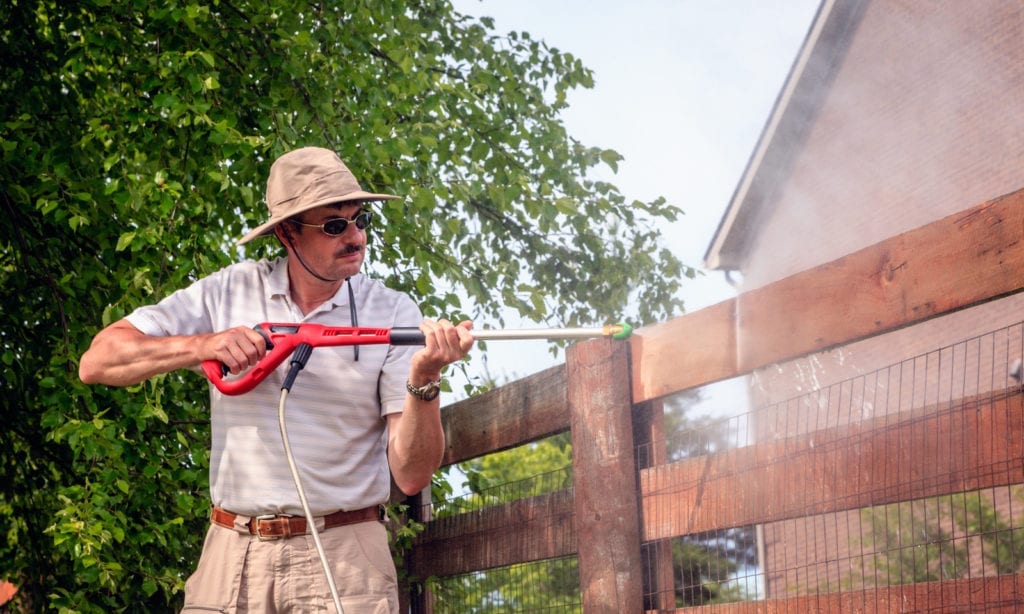
The Surface
One of the key things you should consider when picking out a pressure washer is the surface you’ll need to clean – not all surfaces are designed to take the full force of a heavy-duty pressure washer, and others might struggle with certain types of detergent or be weak to a particular style of cleaning.
In many cases, things like concrete and brick will be perfectly fine, but not all surfaces will be made of a single material. For example, if you’re cleaning the outside of your home, remember that you’ll generally have glass windows on most sides of the building.
While they can often endure a lot of damage, they might not be able to stand up to a direct blast of water from a high-pressure hose, and you could even end up damaging them directly without realizing it. This can also happen with wood, metal, and other surfaces that need treatment or extra layers to withstand water damage properly.
Metal is also very susceptible to rust if it’s not been appropriately treated, which can lead to a slightly dirty metal beam or support looking much worse if you shower it with high-pressure water. While this isn’t a very common situation, it’s still easy to end up forgetting that water can harm some surfaces.
There’s also the problem of the dirt and stains themselves – some of them will need detergents or cleaning solutions that can cause damage to the surface they’re on, so blasting it with a high-pressure hose can cause more damage than it solves.
Relying on a high-pressure hose for every cleaning job can backfire quickly, so you should work out which situations you’ll actually be able to use it for, especially if your home has a lot of walls or outside structural sections that are made with not-very-water-resistant materials.
Expert Tip
Pressure washers are often sorted into different grades depending on their pressure output – in general, most types above 3000 PSI are considered “heavy duty” or “professional grade.”
Did you know?
Not all gas-based pressure washers operate at the same volume – the amount of noise one produces depends on not only the engine but any moving parts in the design, including the pump.